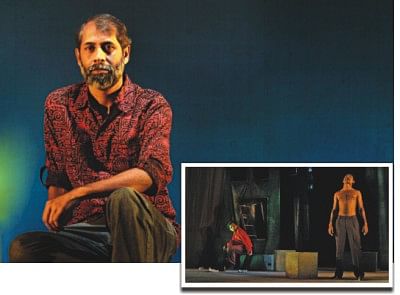"We are going through a transition"

A scene from “Gondar”, directed by Emon (inset). Photo: Mumit M.
Kazi Toufikul Islam Emon, one of the better-known members of the troupe Prachyanat, said that the current theatre scene is not that promising. He is of the view that Bangladeshi theatre is going through a transition. “Many say theatre is in its heyday now. I don't agree. Actually we are going through a transition. People talk about the number of productions of a certain standard in recent times. But if you compare this with the situation couple of years back, you'd realise that it's been a gradual demotion,” said Emon, one of the 11 activists who formed Prachyanat in 1997.
Emon directed three plays for his troupe so far and acted in all of its popular plays. The multi-talented activist has been tirelessly involved in theatre over the last two decades. Plays directed by him -- “Gondar”, “Kinu Kaharer Thetar” and “Mayer Mukh” -- have been lauded by the audience.
As theatre still remains as a non-profitable performing art form in our country, most artistes, directors, technicians and activists have to do something else for a living. Emon is no exception either. He teaches theatre at Scholastica School. He considers himself fortunate. “I know several individuals who left theatre because their professions don't leave much time for anything else, while many are struggling to maintain a balance between their work and theatre,” said Emon.
This uncertainty, obligations are damaging theatre -- Emon feels. He said, “After a certain age, you have to take on certain responsibilities. Some need to earn money to take care of their families, while for some demands are few. But you need money, regardless, to survive. As everything gets more expensive, the obligations to make money are more acute than before. Why would bright, young individuals take deep interest in theatre if they see it is a medium that gives nothing in return? This is why, I think, they consider theatre as a transitory platform.”
Previous generations of actors, directors not grooming enough successors is a major setback, according to Emon. He said, “What seniors give us is a platform. But they are failing to create successors.
“No corporate house or individual coming forth to provide patronage and no interested investors. How would theatre activists survive? Without them, how would theatre survive? I'm quite sure that most Dhakaiites are not aware that every evening there's some show at Shilpakala Academy. Does a rickshawala consider watching a play at Shilpakala? If not, then we should approach him and invite him to see the plays. It is our duty to generate mass interest.”
The actor-director thinks that the media can play a key role in this regard. “I think the media never gives priority to theatre. When an actor attains success in other mediums, then the media discovers his/her theatre background. I have been involved in theatre over two decades. How many people know me? If I get a breakthrough role in a film, then people would know that I'm a theatre activist as well. But the emphasis should be on my roots -- theatre. If we can start recognising the significance of theatre as an art form, young individuals will show more interest in it,” said Emon.
Emon also finds lack of constructive criticism and exchange of views to be detrimental. In this regard, he pointed out the shortage of theatre related journals and publications.
Emon doesn't seem interested in other aspects of theatre besides staging plays. He said, “I'm not at all interested in the Group Theatre Federation. It's become a reflection of our political system, where leaders become active only around elections. Over the years, it has done little to improve the situation of theatre.
“Theatre is not a transitory medium, rather it teaches that there can be a better future,” Emon said.

 For all latest news, follow The Daily Star's Google News channel.
For all latest news, follow The Daily Star's Google News channel. 



Comments